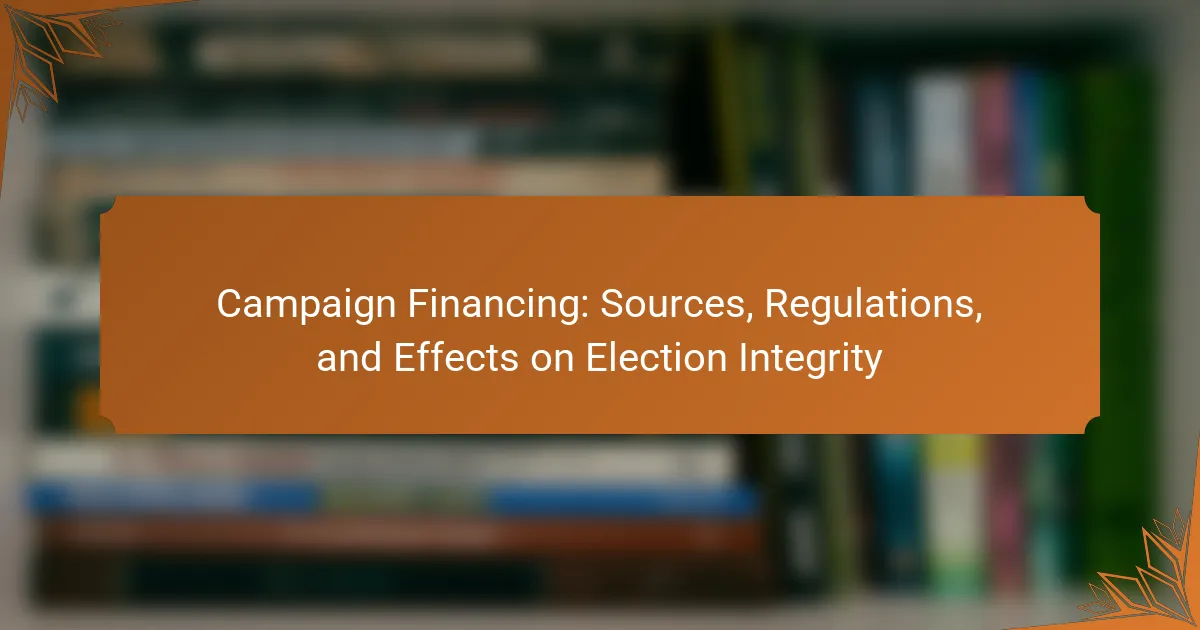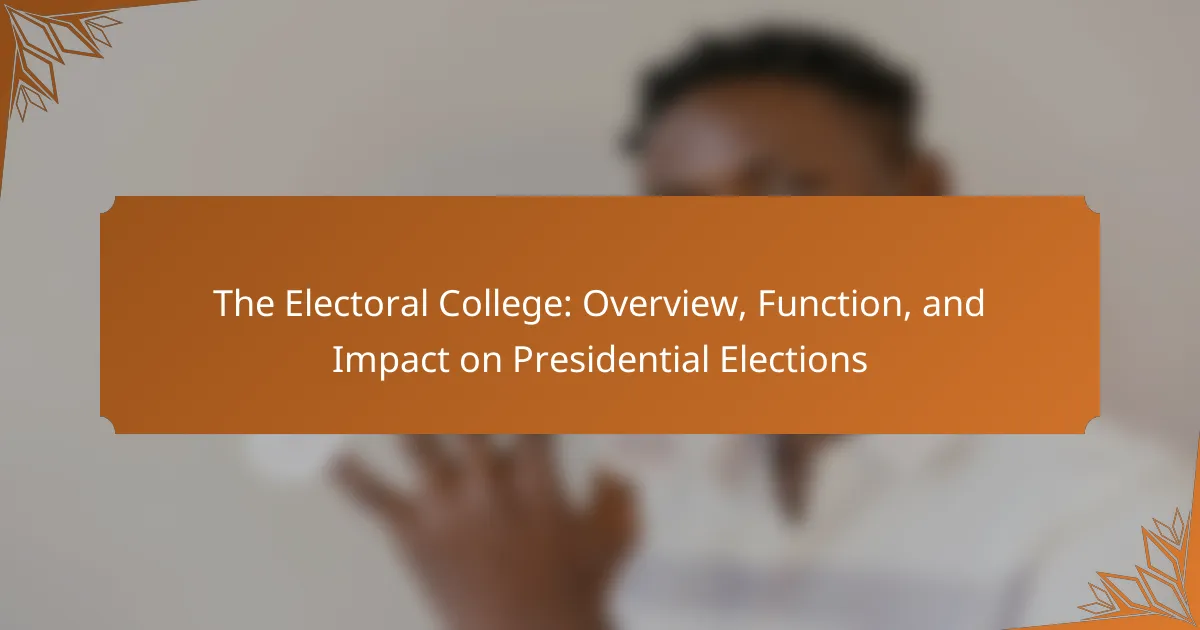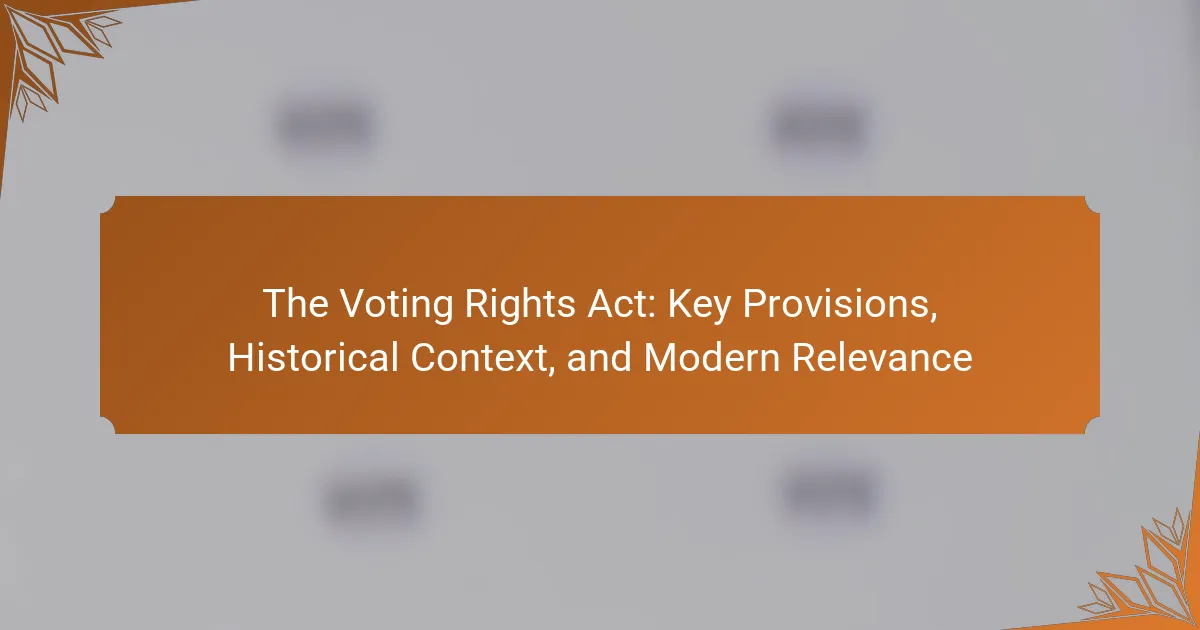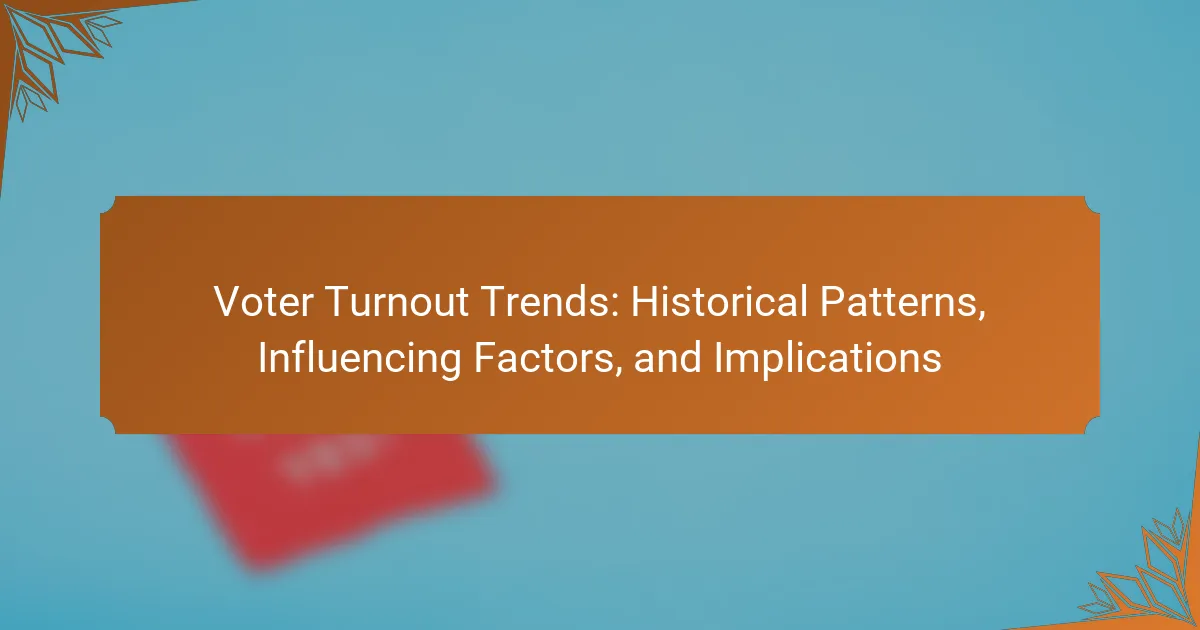Campaign financing is the process of raising and spending funds to promote candidates during elections, involving various sources such as individual contributions, political action committees (PACs), party donations, and public funding. This financial aspect significantly impacts the competitiveness of elections, as evidenced by the over $7 billion raised for the 2020 U.S. elections. Regulations, enforced by the Federal Election Commission (FEC), govern the contributions and expenditures to ensure transparency and fairness, including limits on individual donations and requirements for disclosure. The article will explore the key sources of campaign financing, the role of regulations in shaping the funding landscape, and their effects on electoral integrity and competition.

What is Campaign Financing?
Campaign financing refers to the funds raised and spent to promote candidates in elections. It encompasses various sources, including individual contributions, political action committees (PACs), and party donations. Campaign financing plays a crucial role in determining the competitiveness of elections. According to the Federal Election Commission, candidates raised over $7 billion for the 2020 U.S. elections. This financial aspect directly influences campaign strategies and voter outreach efforts. Regulations govern how these funds can be raised and spent to ensure transparency and fairness in the electoral process.
How does Campaign Financing impact elections?
Campaign financing significantly impacts elections by influencing candidate viability and voter perceptions. Candidates with substantial financial backing can afford extensive advertising and outreach. This increases their visibility and chances of winning. For instance, a 2016 study by the Center for Responsive Politics found that candidates who spent more than their opponents were more likely to win their races. Additionally, campaign financing can lead to policy influence. Donors may seek favorable legislation in return for their contributions. This creates potential conflicts of interest and raises concerns about election integrity. Overall, the flow of money in campaigns shapes the electoral landscape and affects democratic processes.
What are the primary sources of Campaign Financing?
The primary sources of campaign financing include individual contributions, political action committees (PACs), and party contributions. Individual contributions are donations made by voters to support candidates. These contributions can be limited by federal and state laws. Political action committees (PACs) collect funds from members and donate to campaigns. PACs can represent various interest groups. Party contributions come from political parties to their candidates. These funds often support party-backed candidates during elections. Other sources include self-funding by candidates and public financing in some jurisdictions. Public financing programs provide funds from the government to eligible candidates.
How do different sources influence candidates?
Different sources influence candidates by shaping their campaign strategies and funding. Candidates often rely on donations from individuals, corporations, and political action committees (PACs). These contributions can determine the resources available for advertising, outreach, and events. For instance, candidates with substantial corporate backing may prioritize business-friendly policies. Research shows that candidates receiving large donations from specific industries tend to align their platforms with donor interests. Additionally, grassroots contributions can empower candidates to connect more authentically with voters. Studies indicate that candidates funded by small donations often focus on issues that resonate with their constituents. Ultimately, the influence of various funding sources can significantly impact candidates’ positions and electoral success.
Why are regulations important in Campaign Financing?
Regulations are important in campaign financing because they ensure transparency and fairness in the electoral process. They help prevent corruption by limiting the influence of money on political decisions. Regulations also establish contribution limits, which reduce the risk of undue influence from wealthy donors. For example, the Federal Election Commission (FEC) enforces rules that cap individual contributions to candidates. This promotes a level playing field among candidates, allowing for a more democratic election process. Furthermore, regulations require disclosure of funding sources, which holds candidates accountable to the public. Studies show that transparency in campaign financing increases voter trust and participation in elections.
What types of regulations exist for Campaign Financing?
Campaign financing regulations include contribution limits, disclosure requirements, and public funding provisions. Contribution limits restrict the amount individuals and organizations can donate to campaigns. Disclosure requirements mandate that candidates report their funding sources and expenditures. Public funding provisions provide financial support from the government for qualifying candidates. These regulations aim to promote transparency and fairness in the electoral process. For instance, the Federal Election Commission enforces these rules in the United States.
How do regulations vary across different jurisdictions?
Regulations on campaign financing vary significantly across different jurisdictions. Each jurisdiction establishes its own rules regarding contribution limits, disclosure requirements, and spending caps. For example, some states impose strict limits on individual contributions, while others allow larger donations. Disclosure requirements also differ; some jurisdictions mandate immediate reporting of contributions, while others have more lenient timelines. Additionally, public funding of campaigns is available in some areas but not in others. These variations can affect the overall integrity of elections. Research indicates that jurisdictions with stricter regulations often report higher voter trust and engagement.
What are the potential effects of Campaign Financing on election integrity?
Campaign financing can significantly impact election integrity. High levels of campaign financing may lead to undue influence from wealthy donors. This can skew political priorities toward the interests of a few rather than the general public. Research indicates that candidates with more funding often receive more media coverage. This coverage can create an uneven playing field, affecting voter perceptions. Additionally, excessive financing can foster corruption and reduce public trust in the electoral process. Studies show that transparency in campaign financing is crucial for maintaining integrity. For instance, the Center for Responsive Politics highlights that dark money can obscure donor identities, complicating accountability. Overall, the effects of campaign financing on election integrity are profound and multifaceted.
How does Campaign Financing contribute to perceived corruption?
Campaign financing contributes to perceived corruption by creating an imbalance of power in political influence. Large donations from individuals or corporations can lead to the perception that elected officials are beholden to their financial backers. This perception is heightened when donors expect favorable policies in return for their contributions. According to a 2014 Pew Research Center study, 75% of Americans believe that campaign contributions lead to corruption. Additionally, high-profile cases of political scandals often involve significant campaign donations, reinforcing public skepticism. The lack of transparency in campaign financing further exacerbates these concerns, as voters may not know the sources of funding behind candidates. Overall, the dynamics of campaign financing can undermine trust in the electoral process and fuel the belief in systemic corruption.
What role does transparency play in maintaining election integrity?
Transparency is essential for maintaining election integrity. It ensures that the electoral process is open and accountable. Voters can verify the legitimacy of the election process and outcomes. Transparency reduces the risk of fraud and manipulation. It allows for public scrutiny of campaign financing and expenditures. For example, the Federal Election Commission mandates disclosure of campaign contributions. This helps identify potential conflicts of interest and undue influence. Historical cases show that lack of transparency can lead to public distrust. In contrast, transparent practices foster confidence in electoral systems.

What are the key sources of Campaign Financing?
The key sources of campaign financing include individual contributions, political action committees (PACs), party contributions, and public funding. Individual contributions are donations made by voters to candidates or political parties. Political action committees (PACs) collect funds from members and donate to campaigns. Party contributions come from political parties to support their candidates. Public funding is provided by the government to qualifying candidates based on specific criteria. In the 2020 election cycle, individuals contributed approximately $3.4 billion, while PACs contributed about $1.5 billion, demonstrating the significant role of these sources in campaign financing.
How do individual contributions affect Campaign Financing?
Individual contributions significantly influence campaign financing. They provide essential funding for candidates’ campaigns. These contributions can help candidates reach voters through advertising and outreach efforts. The amount of individual contributions can determine a candidate’s competitiveness in elections. For example, in the 2020 U.S. elections, individual contributions made up a substantial portion of total campaign funding. According to the Federal Election Commission, individuals contributed over $2.5 billion to federal candidates. This financial support can enhance a candidate’s visibility and viability. Moreover, individual contributions can reflect voter support for a candidate’s platform. Therefore, they play a crucial role in shaping the overall dynamics of campaign financing.
What are the limits on individual contributions?
The limits on individual contributions to political campaigns are set by federal law. For the 2023-2024 election cycle, an individual may contribute a maximum of $3,300 per candidate per election. This limit applies to both primary and general elections. Additionally, individuals can contribute up to $35,000 to a political party per year. These limits are enforced by the Federal Election Commission (FEC) to ensure transparency and fairness in campaign financing. The contribution limits are adjusted for inflation every election cycle.
How do individual contributions compare to other sources?
Individual contributions are typically smaller than other sources of campaign financing. They often average around $200 per donation. In contrast, corporate donations can reach thousands or millions of dollars. According to the Center for Responsive Politics, individual contributions accounted for approximately 45% of total campaign funding in recent elections. Super PACs and large donors have become increasingly influential, providing significant financial support. This creates a disparity in the influence of individual versus corporate or institutional contributions. Overall, while individual contributions play a vital role, they are often overshadowed by larger funding sources.
What role do political action committees (PACs) play in Campaign Financing?
Political action committees (PACs) play a significant role in campaign financing by raising and distributing funds to support political candidates. PACs collect contributions from members or employees of organizations and then donate to candidates who align with their interests. They can contribute directly to candidates’ campaigns, as well as spend money on independent expenditures to advocate for or against candidates. According to the Federal Election Commission, in the 2020 election cycle, PACs contributed over $1.5 billion to federal candidates. This funding is crucial for candidates to finance their campaigns and reach voters. PACs can influence election outcomes by amplifying the voices of their supporters through financial contributions. Their activities are regulated by federal and state laws to ensure transparency and limit the influence of money in politics.
How do PACs gather and distribute funds?
Political Action Committees (PACs) gather funds through contributions from individuals and organizations. They often solicit donations from members, supporters, and affiliated groups. PACs may also organize fundraising events to increase their financial resources. Additionally, they can receive funds from their parent organizations or other PACs.
Once funds are gathered, PACs distribute them to candidates, parties, or other political committees. They typically allocate funds based on strategic interests, such as supporting candidates who align with their goals. PACs must adhere to federal regulations regarding contribution limits and reporting requirements. According to the Federal Election Commission, PACs can contribute up to $5,000 per candidate per election. This ensures transparency and accountability in the distribution process.
What are the advantages and disadvantages of PAC funding?
PAC funding has several advantages and disadvantages. One advantage is that PACs can raise significant amounts of money, providing candidates with essential financial support. For example, in the 2020 elections, PACs contributed over $1.5 billion to various campaigns. Another advantage is that PACs enable collective political action, allowing individuals to pool resources for shared goals. This collective effort can amplify the voices of specific interest groups.
However, there are notable disadvantages. One disadvantage is that PAC funding can lead to undue influence over elected officials. Research shows that politicians may prioritize the interests of their PAC donors over their constituents. Additionally, PACs can contribute to political polarization by funding candidates who align strictly with their ideologies. This can hinder bipartisan cooperation in governance. Overall, while PAC funding can enhance campaign resources, it also raises concerns about fairness and representation in the political process.

How do regulations shape Campaign Financing?
Regulations shape campaign financing by establishing rules governing contributions and expenditures. These rules aim to promote transparency and limit corruption in political funding. For instance, the Federal Election Commission (FEC) enforces limits on individual contributions to candidates. In 2021, these limits were set at $2,900 per election for individuals. Regulations also require disclosure of campaign contributions and expenditures, enhancing accountability. Additionally, laws like the Bipartisan Campaign Reform Act restrict the use of soft money in federal elections. This act aimed to reduce the influence of large donations from corporations and unions. Overall, regulations directly influence the sources and amounts of funding available to candidates, impacting electoral competition and integrity.
What are the major laws governing Campaign Financing?
The major laws governing campaign financing in the United States include the Federal Election Campaign Act (FECA), the Bipartisan Campaign Reform Act (BCRA), and the Supreme Court ruling in Citizens United v. FEC. FECA, enacted in 1971, regulates the financing of federal elections. It requires candidates to disclose their campaign contributions and expenditures. The BCRA, passed in 2002, aimed to address issues of soft money in campaigns. It restricted the use of corporate and union funds for political advertising. Citizens United v. FEC, decided in 2010, ruled that corporate funding of independent political broadcasts cannot be limited. This landmark decision significantly altered the landscape of campaign financing by allowing more money from corporations and unions. Together, these laws shape the framework for campaign financing in the U.S.
How has the legal landscape changed over the years?
The legal landscape of campaign financing has evolved significantly over the years. Landmark cases like Buckley v. Valeo in 1976 established that spending money to influence elections is a form of protected speech under the First Amendment. This ruling led to a deregulation of campaign contributions and expenditures. The Bipartisan Campaign Reform Act of 2002 attempted to address issues of soft money and issue advocacy. However, the Supreme Court’s Citizens United v. FEC decision in 2010 further expanded the role of money in politics. It allowed corporations and unions to spend unlimited funds on independent political expenditures. As a result, super PACs emerged, reshaping the dynamics of campaign financing. Recent trends indicate ongoing debates about transparency and the influence of dark money in elections. These changes reflect a complex interplay between free speech and the integrity of electoral processes.
What are the implications of landmark court cases on Campaign Financing?
Landmark court cases significantly shape campaign financing laws in the United States. These rulings influence the amount of money that can be contributed to political campaigns. For example, the Supreme Court’s decision in Citizens United v. FEC (2010) allowed corporations and unions to spend unlimited funds on political advocacy. This ruling led to the rise of Super PACs, which can raise and spend unlimited amounts of money independent of candidates.
Moreover, the case of Buckley v. Valeo (1976) established that spending money to influence elections is a form of protected speech under the First Amendment. This principle has been pivotal in determining the legality of various campaign finance regulations. Consequently, these court decisions have altered the landscape of political financing, increasing the influence of wealthy donors and special interest groups.
The implications extend to voter access and election integrity, as increased funding can lead to a disproportionate influence on political outcomes. Overall, landmark court cases have redefined the regulatory framework governing campaign financing, impacting democracy and electoral processes in the United States.
How do states enforce Campaign Financing regulations?
States enforce campaign financing regulations through various mechanisms. They establish laws that limit contributions and require transparency in funding sources. States monitor compliance by requiring candidates to file regular financial reports. These reports detail contributions, expenditures, and the sources of funding.
State election boards or commissions are responsible for overseeing these regulations. They investigate potential violations and can impose penalties for non-compliance. Some states use public financing systems to promote fair competition. Enforcement also includes audits of campaign finances to ensure accuracy and legality.
For example, California’s Fair Political Practices Commission actively investigates violations and enforces campaign finance laws. These measures help maintain the integrity of the electoral process.
What are the penalties for violating Campaign Financing laws?
Violating campaign financing laws can result in significant penalties. These penalties may include fines, which can range from hundreds to thousands of dollars. In some cases, individuals may face criminal charges, leading to imprisonment. Additionally, violators may be required to forfeit any contributions received in violation of the law. The Federal Election Commission (FEC) enforces these laws and can impose civil penalties. Historical data shows that serious violations can lead to prosecution and convictions. For example, in 2018, a former congressman was sentenced to prison for campaign finance violations.
How can candidates ensure compliance with regulations?
Candidates can ensure compliance with regulations by thoroughly understanding the applicable laws. They should familiarize themselves with federal, state, and local campaign finance laws. Regular training sessions on compliance can help candidates stay updated. Utilizing compliance software can streamline tracking of donations and expenditures. Consulting with legal experts in campaign finance is also advisable. Candidates must maintain transparent records of all financial transactions. Regular audits can identify any compliance issues early. Engaging with regulatory bodies can provide guidance and clarification on complex rules.
What best practices can candidates follow in Campaign Financing?
Candidates should adhere to transparency in campaign financing. This includes disclosing all sources of funding. They must report contributions and expenditures accurately. Establishing a clear budget helps candidates manage funds effectively. Candidates should prioritize small donations to engage grassroots support. They must comply with local and federal regulations regarding campaign finance. Utilizing digital platforms can enhance fundraising efforts. Regular audits of financial records ensure accountability and integrity. Following these practices fosters trust with voters and upholds election integrity.
How can candidates effectively manage their financing sources?
Candidates can effectively manage their financing sources by establishing a clear budget and tracking all contributions. They should prioritize transparency by disclosing funding sources to the public. Utilizing financial management software can streamline tracking and reporting processes. Regular audits of campaign finances help ensure compliance with regulations. Candidates can also cultivate relationships with donors to secure ongoing support. Engaging in grassroots fundraising can diversify funding sources and reduce dependency on large donations. Educating their team on financing laws is crucial to avoid legal pitfalls. These strategies enhance financial stability and maintain campaign integrity.
What strategies enhance transparency and accountability in Campaign Financing?
Implementing strict disclosure requirements enhances transparency and accountability in campaign financing. Mandating that all contributions above a certain threshold be reported publicly ensures that voters can track funding sources. Establishing independent oversight bodies can help monitor compliance with these regulations. Public financing options can reduce reliance on private donations, promoting fairness. Additionally, utilizing technology for real-time reporting can increase accessibility of financial information. Studies show that transparency in campaign financing leads to greater public trust in electoral processes. For instance, the Center for Responsive Politics reported that transparency initiatives correlate with increased voter engagement.
Campaign financing is the process of raising and spending funds to support candidates in elections, involving sources such as individual contributions, political action committees (PACs), and party donations. This article explores the impact of campaign financing on election competitiveness, the various sources of funding, and the importance of regulations that ensure transparency and fairness in the electoral process. It also examines how different funding sources influence candidates’ strategies and policies, the potential effects on election integrity, and the legal landscape governing campaign financing in the United States. Key topics include the role of transparency, compliance with regulations, and best practices for candidates to maintain accountability in their financing efforts.



